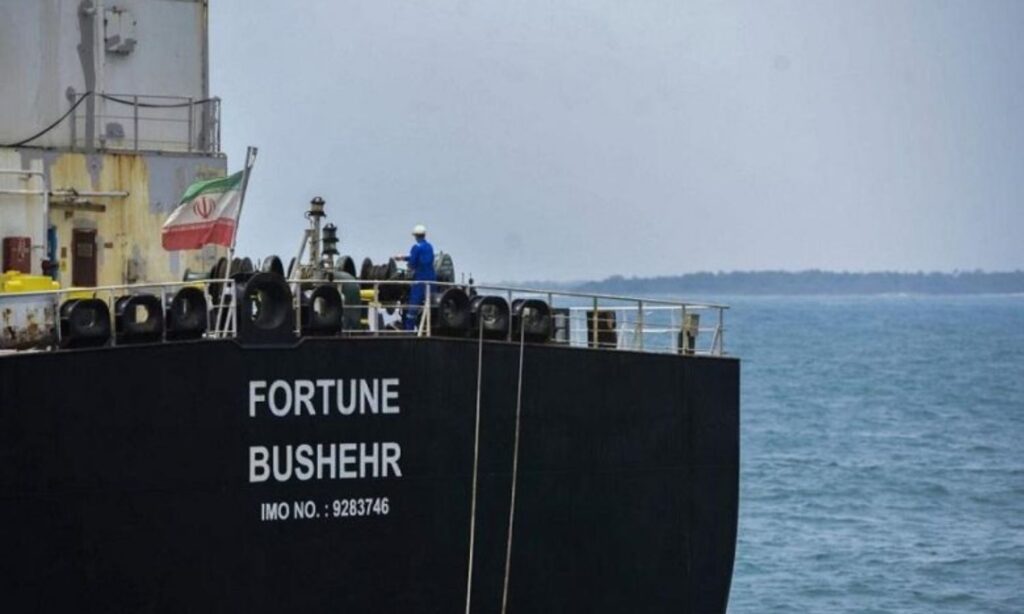The US Treasury Department imposed sanctions on 12 entities and vessels involved in shipping Iranian crude oil and liquefied petroleum gas to Syria and East Asia for Hezbollah’s benefit.
The sanctions included Syrian businessman Luay al-Mallah, brother of shipping tycoon Abdul Jalil al-Mallah, who has been on the sanctions list since June 2021, supporting the financial network of the Houthi group’s financial official, Sa’id al-Jamal, according to the department.
In a statement on Wednesday, September 25, the department said that four vessels linked to Abdul Jalil al-Mallah’s fleet were among the ships subjected to the sanctions.
The brothers (Luay and Abdul Jalil) continued to use their shipping empire to “support Iran’s malign activities and those of its proxies despite the sanctions,” according to the department.
The department pointed out that in an attempt to avoid suspicion, al-Mallah’s ships transporting Iranian oil to Syria and Hezbollah were flying the flag of Panama (a country in Central America) or São Tomé and Príncipe (a country in Central Africa).
Abdul Jalil al-Mallah is considered a captain in smuggling Iranian oil and a significant figure within a massive network that Tehran used to evade international sanctions and deliver its economic support to the groups it supports in the Middle East.
Al-Mallah owns a number of ships and tankers and manages shipping companies in Sweden, Brazil, Panama, the Marshall Islands, Turkey, the United Kingdom, and Greece.
Al-Mallah contributed to transporting and marketing Iranian oil in Europe, then collaborated with other individuals and entities to smuggle the revenues from the smuggled oil to the Syrian regime, the Houthi group, and Hezbollah.
Al-Mallah facilitated the shipment of Iranian crude oil to Syria, enabling Iran to send millions of dollars’ worth of its oil to Hezbollah with the cooperation of the smuggling network run by the Houthi group’s financial official, Sa’id al-Jamal.
Abdul Jalil al-Mallah facilitated millions of dollars’ worth of transactions for the Yemeni company “Swaid & Sons,” a money-exchange company linked to the Houthis, and sent millions of dollars to officials from the Iranian Revolutionary Guard Corps (IRGC) and the Quds Force in Yemen.
In the statement, Bradley Smith, Acting Under Secretary of the Treasury for Terrorism and Financial Intelligence, said that Iran continues to heavily rely on the illicit sale of oil and liquefied petroleum gas by the Revolutionary Guards Corps and Lebanese Hezbollah to “fund their terrorist proxies and destabilizing activities.”
Under these sanctions, all properties of the persons located in the United States or in possession or control of American persons must be reported to the Office of Foreign Assets Control.
Additionally, any entities owned, directly or indirectly, individually or in aggregate, 50% or more by one or more blocked persons are also prohibited.
Moreover, engaging in certain transactions with individuals subject to today’s sanctions carries the risk of secondary sanctions.
With many oil fields in eastern Syria out of the Syrian regime’s control, the latter has relied on oil coming from Iran.
Iran has employed methods to circumvent the sanctions by sending empty and full tankers simultaneously while turning off maritime tracking devices, particularly before or after passing through the Suez Canal, ultimately showing up in satellite images offloading their cargo at the Baniyas oil terminal.
Iran also resorted to changing the flag of the tanker each time, to fly the flag of a country of one of the shareholders owning the tanker, like Panama, which holds more than 40% of the tanker fleet, in addition to other countries not subject to any American or European sanctions.
The US Treasury Department imposed visa restrictions on August 30, targeting 14 officials in the Syrian regime for their involvement in cases of enforced disappearance.
The US Treasury Department stated that this measure adds to the restrictions imposed on 21 officials in the Syrian regime and their immediate family members, which were announced by US Secretary of State Antony Blinken in March 2024 and December 2023.

